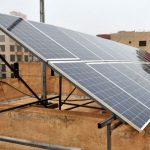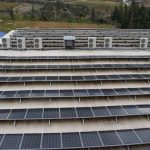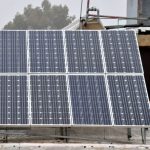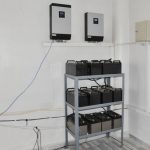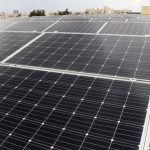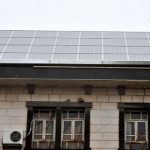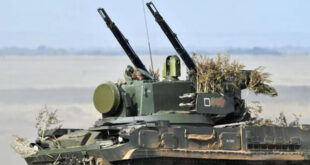Sweida province has witnessed the construction of several renewable energy projects over the past few years as part of the government’s efforts to invest in renewable resource plants and replace traditional forms of power generation.
The Blue Planet for Energy Alternatives private company is currently building al-‘Ajmaa plant for photovoltaic power generation with 1 MW initial capacity at a total cost exceeding SYP 650 million in Hawt village, that will add to the company’s portfolio which includes a number of power facilities in Najran and Habran villages, as well as the installation of a wind-solar hybrid system in al-Qrayya town, according to Samer Alwan, Chairman of the Board of Directors at the company.
On the other hand, Director of the Renewable Energy Arab Company (Reaco), Safwan Qardhab, said that the company has established 4 generating sets to feed the Optical Network Units (ONU) with photovoltaic power in Massad area to ensure the continuity of phone and internet services during power outages.
The experience was hailed as the first-of-its-kind by Head of the Syrian Telecommunications Establishment’s branch in Sweida, Hazem al-Shoufi, since it helps improve the quality of phone service and serve more areas,, adding that it will be extended to include 15 plants across the province.
Head of the Environment Directorate, Ghaleb Abu Hamdan, noted that the directorate started to generate power depending on solar energy with a capacity of 5 Kwh, indicating to efforts exerted to raise awareness on clean and renewable energy through holding symposiums and exhibitions.
In Tartous province, several photovoltaic power generation plants have been built to supply the electrical system with additional amount of energy, taking into consideration the importance of these projects in producing clean, economically-viable and environment-friendly energy.
Director of Power Rationing Department at the General Electricity Establishment in Tartous, Mohammed Barakat, stated that 4 renewable energy projects were put into service since one year and a half, pointing out that there are 16 projects are not licensed yet.
He underlined the role of these projects in supplying the electrical network and preserving the environment as they reduce the consumption of fuel required to produce electricity and the emission of greenhouse gases, not to mention their economic feasibility.
Chairman of the National Energy Research Center, Younes Ali, told SANA that the regulatory environment for investment in renewable energy projects is appropriate and encouraging and there is no legal obstacle for businessmen and local and foreign companies willing to invest in this domain, adding that the economic and technical studies show the economic feasibility of wind and solar energy projects and their contribution to the national economy.
He indicated that a number of agreements were signed with different governmental bodies such as Ministries of Education, Higher Education, Local Administration, Environment and Health to make use of their buildings’ roofs and install solar panels to meet their energy needs.
Head of Electricity Regulation Department, Hiyam al-Imam said that all investors can submit a project proposal to the directorate to be studied after which they are given 3-month-period to complete all procedures upon obtaining the initial approval, then they get the license to generate power.
She added that 22 projects have been licensed, 14 of which were implemented.
 Syrian Arab News Agency S A N A
Syrian Arab News Agency S A N A




